News
Sri Lanka Advances to 200th Position in FIFA Rankings: A Closer Look at the Journey
Sri Lanka’s national football team has made a significant leap, advancing to the 200th position in FIFA’s global rankings following their recent win against Cambodia in the AFC Cup qualifiers. This achievement is a welcome improvement, considering Sri Lanka’s struggle to rise from near the bottom of the table in recent years.
Historical Perspective: A Long Road to Recovery
Sri Lanka’s journey in the FIFA rankings has been a rollercoaster over the past two decades. In 2000, the team ranked 153rd out of 202 countries, signaling potential for growth. Their best position came in 2005 when they climbed to 139th, showcasing some promise on the international stage. However, inconsistency, lack of infrastructure, and limited international exposure led to a steep decline in subsequent years.
In 2010, Sri Lanka dropped to 151st, and by 2015, they slipped further to 172nd. The lowest point came in 2020, when the team was ranked 206th out of 210 countries. This ranking placed Sri Lanka among the bottom five footballing nations globally, reflecting the challenges the national team faced.
Analyzing the Current Rise
The recent jump to 200th may seem modest, but it represents a glimmer of hope for the Sri Lankan football community. The win against Cambodia in the AFC Cup qualifiers was crucial, not just for points but for morale. Cambodia, ranked higher than Sri Lanka before the match, was a key opponent. Defeating them showed that Sri Lanka has the potential to compete in international fixtures with the right preparation and strategy.
This rise also highlights the incremental changes happening within the national setup. While there’s still a long way to go to reach their highest-ever ranking of 122nd in 1998, the recent improvements suggest that Sri Lanka is gradually moving in the right direction. However, the rise in rankings also raises important questions about sustainability. Can Sri Lanka maintain this upward trajectory, or will it be a short-lived success?
Key Challenges Ahead
- Inconsistent Performances: Sri Lanka’s ranking fluctuations over the years indicate that consistency is one of their greatest challenges. The team needs to string together positive results in upcoming AFC Cup matches to solidify their current standing.
- Domestic Football Development: The success of any national team depends heavily on the strength of its domestic leagues. Sri Lanka’s football infrastructure remains underdeveloped compared to regional counterparts. A lack of investment in grassroots programs, coaching standards, and facilities has hindered the production of talented players. Revamping domestic leagues and focusing on youth development will be crucial for long-term success.
- International Exposure: Limited exposure to high-level international competition is another major hurdle. Sri Lankan players lack the experience of regularly competing against top-tier teams, both in South Asia and beyond. Engaging in more international friendlies and tournaments could bridge this gap and provide valuable learning experiences.
- Federation Mismanagement: Sri Lanka’s football administration has been criticized for inefficiency, mismanagement, and lack of vision. For real progress to be made, there must be a shakeup in how football is governed in the country. Transparent and accountable leadership is essential to fostering an environment where players can thrive.
Looking Ahead: The Future of Sri Lankan Football
Sri Lanka’s jump in the FIFA rankings may serve as a motivating factor for both the players and fans. The national team has the talent and potential to improve further, but consistent development requires a holistic approach. More investment in the sport at both the grassroots and national levels is necessary, along with sustained efforts to build a strong football culture in the country.
If Sri Lanka can build on this recent success and address the systemic issues holding them back, there’s hope for them to move further up the rankings. With strategic focus and proper support, the nation could aspire to return to the levels seen in the late 1990s and early 2000s.
As Sri Lanka moves forward, their ranking will be a clear indicator of progress in both domestic football development and international competition, and it remains to be seen whether this improvement is the start of a new era for Sri Lankan football or just a temporary rise.
Cricket
Sri Lanka Sweats on Pathirana Injury; Hasaranga Comeback on the Cards
Sri Lanka’s ICC Men’s T20 World Cup 2026 campaign has suffered a major setback, with fast bowler Matheesha Pathirana likely to miss the remainder of the tournament due to injury.
The 23-year-old sustained a calf injury during Sri Lanka’s Group B encounter against Australia on Monday at the Pallekele International Cricket Stadium. The incident occurred in his opening over when, after delivering the fourth ball, Pathirana suddenly pulled up clutching his left calf before collapsing to the ground in visible discomfort.
Team physiotherapists rushed onto the field as concerned teammates gathered around. The pacer was unable to leave the field without assistance, immediately raising concerns about the severity of the injury. Captain Dasun Shanaka completed the over in his absence.
Shortly after, Sri Lanka Cricket (SLC) confirmed that Pathirana would take no further part in the match. In a brief statement, SLC said the bowler had experienced discomfort in his left calf and would undergo medical scans for a full assessment.
Major Blow to Pace Attack
Initial indications suggest the injury could rule Pathirana out for the rest of the World Cup — a significant loss for Sri Lanka’s bowling unit. Known for his slingy action and deadly yorkers, especially at the death, Pathirana has been one of Sri Lanka’s most reliable T20 strike bowlers.
If ruled out, team management is expected to consider Dilshan Madushanka or Nuwan Thushara as potential replacements. While both offer pace and variety, replacing Pathirana’s unique skillset will be a challenge.
Hasaranga Return Under Discussion
In a parallel development, Sri Lanka are reportedly exploring the possibility of bringing Wanindu Hasaranga back into the squad as he continues recovery from a hamstring injury.
Although Hasaranga has not yet regained full match fitness, officials are said to be evaluating whether he could feature later in the tournament — particularly if Sri Lanka qualify for the Super Eight stage.
With their final group match effectively a dead rubber, Sri Lanka have a short window to reassess their injury situation and make strategic decisions. The team management is likely to wait for clearer medical reports before confirming any squad changes.
As the tournament enters a decisive phase, Sri Lanka’s hopes may depend as much on fitness updates as on performances on the field.
Cricket
Colombo Set for High-Voltage India–Pakistan Night Battle
ICC Men’s T20 Cricket World Cup
Colombo is preparing for one of cricket’s biggest nights as India and Pakistan meet in a marquee clash of the ICC Men’s T20 Cricket World Cup at the R. Premadasa Stadium on Sunday.
Beyond tactics and statistics, this is a contest built on history and pride. With both teams in form and World Cup ambitions on the line, Sunday night promises a high-quality contest under the Colombo lights.
Cricket
Wanindu Hasaranga Ruled Out of ICC Men’s T20 World Cup 2026 Due to Hamstring Injury
Sri Lanka’s ICC Men’s T20 World Cup 2026 campaign has suffered a massive setback, with star all-rounder Wanindu Hasaranga ruled out of the remainder of the tournament due to a hamstring injury.
Medical scans conducted after Sri Lanka’s opening match against Ireland confirmed that the leg-spinning all-rounder will require several weeks of rehabilitation, effectively ending his participation in the global showpiece event.
Hasaranga, a central figure in Sri Lanka’s T20 plans over the past few years, sustained the injury during the early stages of the tournament. His absence leaves a significant void in both the bowling and lower-middle-order batting departments.
Widely regarded as one of the most dangerous T20 bowlers in world cricket, Hasaranga’s impact in ICC tournaments has been remarkable. With 40 wickets, he currently stands as the second-highest wicket-taker in T20 World Cup history — a statistic that underlines the scale of the blow to the co-hosts.
Beyond the numbers, Hasaranga’s ability to break partnerships in crucial moments and provide quick runs under pressure has made him indispensable to Sri Lanka’s balance in white-ball cricket.
Attention now turns to potential replacements. Leg-spinner Dushan Hemantha is expected to be named as Hasaranga’s replacement, pending official approval from Sri Lanka Cricket and the ICC Event Technical Committee. While Hemantha offers promise and attacking intent, stepping into the shoes of Sri Lanka’s premier match-winner will be a formidable challenge.
As of now, Sri Lanka Cricket is yet to issue a formal statement confirming the squad alteration.
With the tournament still in its early stages, Sri Lanka must now regroup quickly. The onus will fall on the remaining senior bowlers to shoulder added responsibility as the hosts attempt to keep their World Cup ambitions alive without one of their most influential players
-
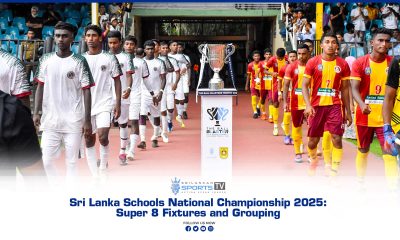
 Football1 year ago
Football1 year agoSri Lanka Schools National Championship 2025: Super 8 Fixtures and Grouping
-

 News1 year ago
News1 year ago2025 Schools Rugby Season Set to Thrill Fans with Knockout and League Action
-

 Cricket9 months ago
Cricket9 months agoNuwan Thushara Shines as RCB Storms into IPL 2025 Final
-

 Live4 years ago
Live4 years agoLive Broadcast of Syria vs Sri Lanka | AFC U23 Asian Championship Qualification
-
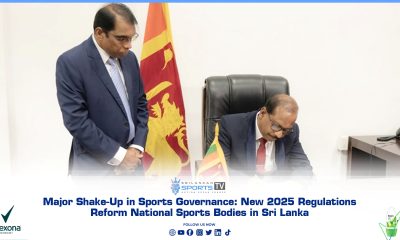
 News9 months ago
News9 months agoMajor Shake-Up in Sports Governance: New 2025 Regulations Reform National Sports Bodies in Sri Lanka
-
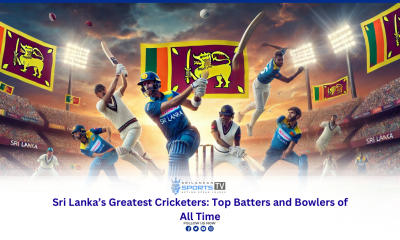
 Cricket1 year ago
Cricket1 year agoSri Lanka’s Greatest Cricketers: Top Batters and Bowlers of All Time
-
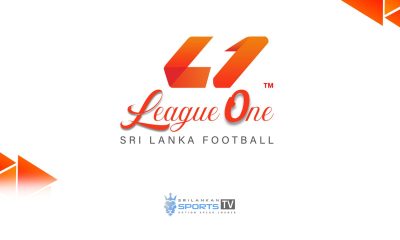
 Football1 year ago
Football1 year agoFFSL Rebrands Division-1 as ‘League-One’ with a Bold New Vision
-
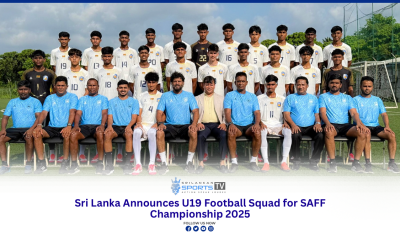
 Football10 months ago
Football10 months agoSri Lanka Announces U19 Football Squad for SAFF Championship 2025

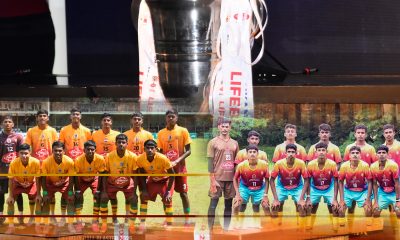



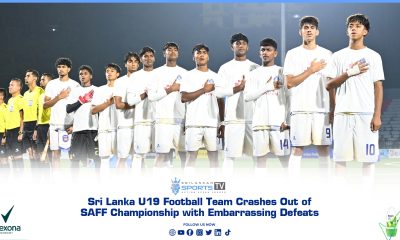

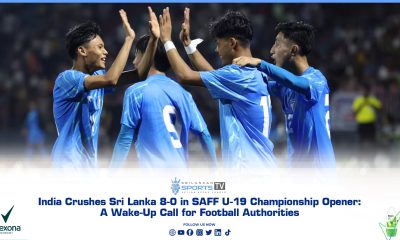

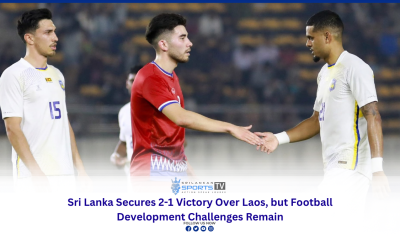








You must be logged in to post a comment Login